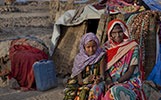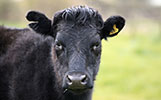| |  | | | Droughts in Ethiopia and Zimbabwe are killing peoples' livestock, and thus depriving them of their livelihoods as well; spare a thought for those who have lost everything as a result. When we talk about transferring lessons from the top producers in the world to the bottom, we must also remember that there are a billion marginal or subsistence producers in developing countries whose livelihoods depend upon livestock, but who do not have resources to invest in improvements, even if they are aware of what needs to change. We should be identifying ways to close the gap for them, both to ensure their livelihoods and improve the efficiency of livestock everywhere. | | |  | | | | The El Niño Drought Hits Livestock Hard In Zimbabwe 
Zimbabweland | February 22, 2016
The El Niño drought is hitting hard this year. Livestock in particular are suffering, as grass and water are scarce. Some fear that it could be as bad as 1991–92 when around a million cattle died.
To date some 7000 cattle mortalities have been recorded, the majority of which have been in Masvingo province, as well as Matabeleland. Government and aid agencies are encouraging farmers to destock, urging people to buy supplementary feed to save breeding stock. Drought task teams have been established in the affected provinces, and emergency feedlots are being established. It is a very serious situation.
Mongolia Appeals for Aid as "Dzud" Kills Livestock and Livelihoods
Joanna Chiu, DPA International | February 27, 2016
Nature has been hard on Mongolia. Little rain in summer followed by too much snow and cold in winter is killing off the country's livestock, leaving the people who depend on them in dire straits. Mongolia is experiencing a natural disaster called a dzud. The phenomenon usually occurs after a summer drought is followed by heavy snowfall that makes already meagre pastures inaccessible to livestock.
The national government appealed for international aid on Wednesday, stating that snow has covered more than 70 per cent of the territory and livestock losses have reached at least 125,000.
Soil Fungi Key to Grass Production
Kim Nielsen, Grainews | February 19, 2016
It seems the main key in the transformation of what we were seeing above the ground is really a result of what took place below the surface. It has been said if there is an abundance of plant species above ground there is an equal diverse abundance of microorganisms in the soil below.
Calls for Beef Farmers to Get Fair Share of the Margin 
Farming UK | March 2, 2016
NFU Scotland Livestock Committee is calling for a fairer share of the retail price of beef to be fed down the chain. Livestock chairman Charlie Adam said: "Many shoppers buying quality Scotch beef will be surprised to know that more than half the money they are paying is going to retailers and processors and the share going back to the farmer producing the beef is falling.
EU Exit Would 'Cripple' UK Livestock Sector
Johann Tasker, Farmers Weekly | March 3, 2016
The single market made reaching Europe's 500 million consumers simpler and generated £11bn for farmers and food producers, Defra secretary Liz Truss claimed. "About 60% of our food and drink exports go to the EU with no market access barriers. "For some of our farming sectors that rely on trade with Europe, facing the same import tariffs as other countries outside the EU would be crippling.
Beef Exporter Argentina Clears Way to Import Cattle from Uruguay
AgWeek | March 3, 2016
Argentina clinched a deal this week to import Uruguayan cattle for fattening and slaughter, underlining a push by new President Mauricio Macri to step up beef production as part of his farm sector reform plan.
Opinion: Aussie Processing Jobs Disappear Over the Horizon on a Boat
By Matt Journeaux, BEEF Central | February 22, 2016
JBS's Townsville export beef plant has postponed its scheduled seasonal start from February 29 to at least the end of March. No beef plant in Australia is as heavily exposed to the booming live export trade, and in this opinion piece, the AMIE's Matt Journeaux questions the economic and social impact he sees live exports as having on regional and rural economies, where most processors are located.
Beef Efficiency Doubts
The Scottish Farmer | February 25, 2016
The objective of the scheme is to help suckler herds become as efficient as possible via a range of improvements focusing on cattle genetics and management practice on–farm. ScotGov hope that the scheme will produce improved genetic selection in respect of growth rates, feed conversion, maternal behaviour, nutrition practice and disease resistance.
Food Standards Australia and New Zealand (FSANZ) listed HGP as the "naturally occurring" hormones trenbolone, oestrogen, progesterone and testosterone, which are injected into local cattle. "HGPs are used safely in Australia," FSANZ said. "The hormones come in small implants placed under the skin on the back of the ear, slowly releasing a low dosage, usually over 100 to 200 days, depending on the product used."
With Drought Killing Their Livestock, Many Ethiopians Have No Other Source of Food Or Income
Oxfam | February 23, 2016
IWhen owning a herd of cows is like having money in the bank, losing it can mean terrible things for a family. But that's exactly what's happening to countless Ethiopian households as the worst drought in 30 years wipes out the livestock many use for food and income.
Across the country, where farmers rely largely on rain to feed their crops and water the pastures on which their animals depend, drought is pushing more than 10 million people into circumstances so dire they now need humanitarian aid. In December 2015, the Ethiopian government issued an appeal for $1.4 billion to help it respond. Donors have stepped up to fund only 48 percent of the appeal so far.
EU Donates €8m to Fight Foot and Mouth
Mthandazo Nyoni, News Day | February 19, 2016
The fund, expected to run over a four–year period under the theme Increased household food, income and nutrition security through commercialisation of an integrated and sustainable smallholder livestock sector in Zimbabwe, is being implemented by Food and Agriculture Organisation (FAO) in partnership with Department of Livestock and Veterinary Services and two non–governmental organisations – Help Germany and Lead.
| | | |  | | | | View More Stories | | | |
